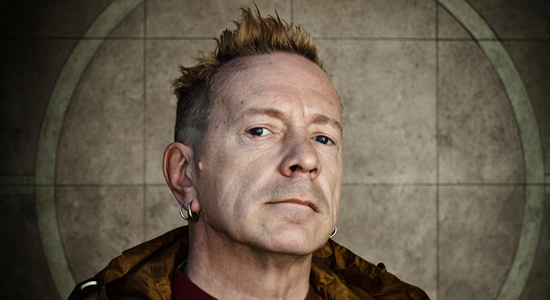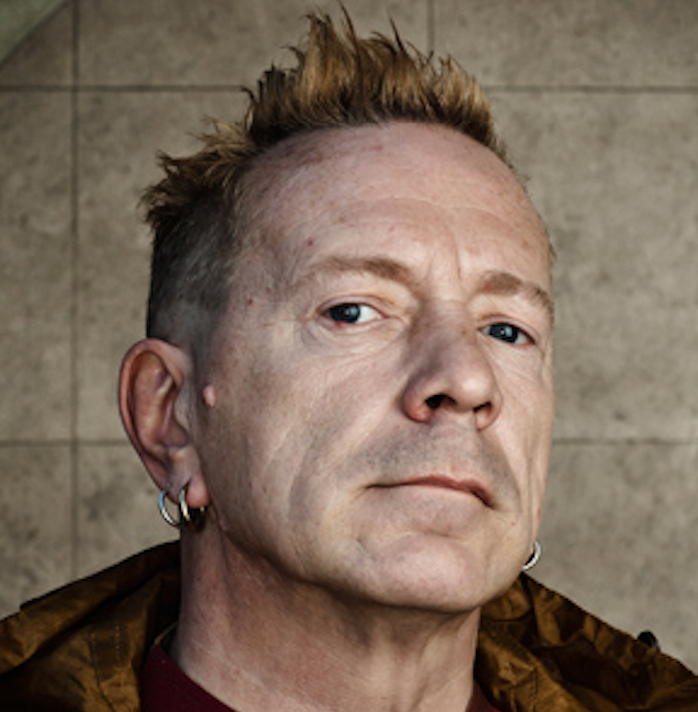
In his time as a writer, be it as a Sex Pistol or a PiL head, John Lydon has certainly hurled hurtful words into his varying sonic landscapes. If he wasn’t dressing down the Royals or the executors of organized religion and business throughout punk rock’s blistering roar, he was imbuing the dub-filled electronic wonk of Public Image Limited with rants about socialism, desperation and betrayal. (PiL also contains deeply emotional songs about the passing of Lydon’s mother and the wont that is love.) So, when I mention to Lydon that I’d keep our conversation painless, he laughed, “I just came from the dentist’s office, so that’s a remarkable claim for you to live up to.” Although his Pistols’ Never Mind The Bollocks turns 35 this year with a still-under-discussion multi-package boxed set, our subject is This Is PiL (PiL Official), the first new recording from the band’s floating membership since 1992, and its accompanying touring schedule. Lydon might be a longtime Californian (more than 25 years), but new PiL songs such as “Lollipop Opera” and “The Room I Am In” dig deep to find the psychic squalor behind living in London’s council flats in a way that seems as if he’s never left.
I spoke to you awhile ago about how the Sex Pistols were a learning experience, about how it made you something of a crime-solving detective. How did that time affect what Public Image Ltd would end up being?
That’s where I learned to seriously write songs. I wanted to do it to the best of my ability and be as truthful as is humanly possible. I achieved that. The problem with that first band of mine was the interpersonal conflicts within it that were, no doubt, spurred on by management shenanigans. Unfortunately, we were all too young to see that and we all got played against each other. An unfortunate situation, really. That’s why years later we got back together—not so much as a reformation, but as an affirmation of how we respected each other in light of our previous history. Now that can be put to rest.
Do you feel as if what you do with PiL far and away outstrips that which you executed with the Sex Pistols?
I think what it is, especially now, is that I find myself in a very healthy forward-thinking situation. That was always true to the idea, mind you. I’m not tied down or obliged to corporate-record-label thinking any longer. That was a serious problem, but one I managed to overcome. There came a point where I ceased to function. I think that’s what made my work with PiL stronger.
“Ceasing to function” sounds like an audacious claim.
Indeed. But I would have preferred to cease to function for two decades (the time between PiL albums) than put out shit or deal with shit. Now we’re totally independent and in a situation where we can finance it enough to do things our way—to record and to put it out through our own label together. Now we only have ourselves to blame, which, I must say, is very healthy indeed.
Are you saying that there weren’t sounds or words floating around your head for 20 years that you wanted to record? That you cut yourself off from the artistic process?
No, no. I’m saying that I wouldn’t change my philosophy to write a hit record or go through the muck of major labels. Record companies don’t care for that way of thinking. Mind you, I have had quite a number of hit records throughout the years. Yet what I wanted to do and how I wanted to act still wasn’t on their agenda, their way of thinking. Too individual I am. If any aspect of making music was putting them to work in any way, they felt put out. It doesn’t work well for the control-freak aspect of their collective personality, their hold over other bands on their labels. No, I think that this time I’m finally getting it right. That’s a fearful picture for a record-label chief executive to be looking at: artists thinking for themselves. It’s a stupid position to hold, if you think of it. There’s money to be made. We live in the West—we’re not communists.
I spoke to you right before you headed out onto that long 2010 tour with PiL. How did it wind up setting the basis for songwriting collaboration with this edition of PiL?
Bruce Smith and Lu Edmonds are the longest-term members that I ever worked with in any PiL format. They were automatic choices. Plus, I’ve known them both personally for 30-plus years. There aren’t many people you can trust in this business. They’re two of them. We needed fresh blood for a bass player, and Scott Firth was there, fit extremely well musically and personally. We had to do the old material and rehearse because we had no money to get new material, hence that long tour. If the music is anchored around the emotion of a song, it will always be PiL. But we needed to get cash together to do as much.
Was there any consideration to bringing in Jah Wobble and Keith Levene from PiL’s first edition?
The answer is yes. Of course. I approached everyone from PiL’s past just to see what their attitude was and what their angles would be. Several wanted to be paid superstar wage packets—even though they weren’t there throughout the entire PiL catalog. Some of them had to leave because of borderline criminal fucking activities, you know. They wanted to come back, glean the new profits and not help out with any of the outstanding old debt of PiL. I can’t abide another human being talking to me that way. I launched their careers. These guys were babies, unknowns. I had to fight battles with the record labels because of these guys, so to have a band of unknowns … It was disrespectful that they adopted such tone when speaking to me now. It’s a pity. I forgive them. But I won’t forget. Never forget.
Was there a financial goal you were looking to reach with the tour—a number?
Originally we’d have been happy just to get into rehearsal. Thank god for British Butter, because they helped us on that one. I did that commercial for them: “British Butter for the British.” Now we’re all set. That didn’t hurt. [Laughs] That got us into a rehearsal position … We knew that we weren’t going to look for a deal before we had an album finished, so we waited, then we shopped. Then we got negative responses. So, we made our own deal. And none of that came cheap either.
I believe what you’re saying, but still find it hard to believe that no one wanted to sign you.
Joke of jokes, right? It was almost the same level of hilarity as in the past. I even approached EMI (with whom Lydon had mega-problems as a Sex Pistol). All right. I wanted to see what they liked at this point in their corporate life. But they’re dumbfounded still—too slow to pick up the ball. We quickly moved on. But out of respect to the past and just weird curiosity, I wanted to see where their heads were. I knew there might be calamity, but look—I’m not in the business to make enemies or keep enemies. That’s not the agenda. I did it honestly under the flag of friendship. Actually they liked it, the new PiL album, but they just couldn’t make the decision. I didn’t need to concern myself with that way of thinking again. That was my problem in the first place. We tried the smaller major labels as well. Good intentions, but intentions didn’t cut the cheese. Creating our own label wasn’t what we wanted to do—it was a process of elimination. And now a logical conclusion.
Are you including your one-offs in the mix of problems with the majors—did they not see your sales potential?
The stuff with Leftfield. Yes. The labels never thought that would be a hit. The Golden Palominos and Afrika Bambaataa as well, and they were huge. The Bambaataa in particular—remarkable, really, as that came at the beginning of hip hop. The labels never thought I could sell records. Hence, anytime they saw me coming, it was, “Here’s that John Lydon again … grrr.” Whatever their ultimate reasoning, it’s not for me to fathom, but it is fun guessing.
Since you’re labeling and distributing—a job description you probably never thought you’d have—I have to ask: Are you comfortable Facebooking, tweeting and social networking?
No, mate. It’s a bloody nightmare. I had no knowledge of such things, and really had always wanted to avoid those things. We had to take a crash course in it. I understand the overall concept. Still, there are parts I don’t get. There are forms of communication that are being used wrongly at the moment. Let’s see what PiL can make of it. We’re good at figuring stuff out.
The very first thing that I hear on this record—and it’s most impressive—is that your voice sounds, for the first time in your career, your age.
My age? Why, I’m ageless! [Laughs]
The voice sounds aged, wearier. It really works within the contours of the music, what you’re calling the emotional core of the lyrics.
Two solid years of touring will do that to a man. Bear in mind those gigs were two-plus hours each night. That fine-tuned my voice. It’s better than training.
Living as you have on the West Coast for the last 25 years, I find it odd that the album looks mostly at England. The London of your past I get, but that you discuss its present seems odd.
What I’m doing is clarifying my positions from childhood experiences onward. I’m resetting my agenda and making it clearer. The past is not something I’m running away from. Far from that. The past is something I love, where I learned all my values. The core. That’s important to stress.
Is that why you start with “One Drop” and the whole notion of growing up hard in Finsbury Park and where youth’s gone wrong?
Yes. And the record is written with the greatest sense of disappointment with the rioting because people died. I don’t believe in killing anyone for any cause. I do believe in the fact that Britain—its youth in particular—had better start expressing its point in full. I know they are tired of being pushed aside. It’s about proper personal politics. Money vs. elation. The unfair distribution of wealth. Don’t get me wrong—I’m very far from communistic on this one, but you have the right to work too hard and the right to bitch if you don’t get the chance.
If the Pistols were about crime-solving, what is PiL beyond the emotion? Something freer?
Personal politics. Looking inwards and solving your own problems. You can go a long way toward helping others if you can get ahead of that game. When I started, the targets were institutions and governments, not easy targets, not in the social landscape of that time. Groundbreaking on my part, really. PiL is about clearing yourself up inside and, by example, hoping that lifestyle improves the lifestyle of others. My general principle, and that goes for PiL as well, has always been to not tell lies. Cheat no one. I never have.
—A.D. Amorosi







